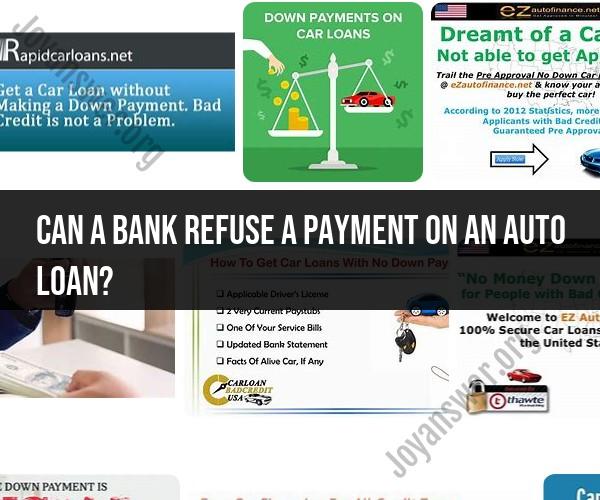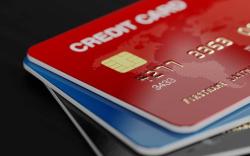Can a Bank refuse a payment on an auto loan?
Yes, a bank or lender can refuse a payment on an auto loan under certain circumstances. Here are some common reasons for a bank to refuse an auto loan payment and possible solutions:
1. Insufficient Funds:
- If the checking or savings account you provided for auto loan payments doesn't have enough funds to cover the payment, the bank can refuse the payment. In this case, the bank may charge you an insufficient funds fee.
Solution: Ensure that your account has sufficient funds to cover loan payments. Monitor your account balance regularly to avoid overdrafts.
2. Payment Arrangement Violation:
- If you've made a specific payment arrangement with the bank, and you fail to follow the agreed-upon terms, the bank may refuse the payment.
Solution: Communicate with your lender to make new payment arrangements or adhere to the existing agreement.
3. Account Closure:
- If you've closed the account linked to your auto loan, the bank won't be able to process the payment.
Solution: Contact your bank and lender to update your payment information with a new or active account.
4. Incorrect Payment Details:
- Providing incorrect account information, such as the wrong account number or routing number, can lead to payment refusal.
Solution: Verify that the payment details are accurate and up to date with your lender. Double-check the information before making a payment.
5. Loan Default:
- If you've defaulted on your auto loan, the bank may refuse further payments and initiate the repossession process.
Solution: If you're facing financial difficulties, contact your lender immediately to discuss options for loan modification, deferment, or a workout plan to bring the loan current.
6. Legal Issues or Bank Error:
- In some cases, a legal issue or an error by the bank may lead to payment refusal.
Solution: If you believe there is a legal issue or a mistake, consult with a legal professional, and contact your lender to resolve the matter.
7. Excessive Late Payments:
- Consistently making late payments or failing to make payments may lead to the bank refusing further payments and initiating collection or repossession actions.
Solution: If you're having difficulty making payments, communicate with your lender as early as possible. They may offer alternatives like loan modification or refinancing.
It's essential to maintain open communication with your lender if you're facing payment issues. Ignoring the problem or repeatedly missing payments can lead to serious consequences, including repossession of the vehicle. Contact your lender to discuss your situation and explore potential solutions to ensure that you can continue making payments on your auto loan.
Under what circumstances can a bank refuse a payment on an auto loan?
A bank can refuse a payment on an auto loan if:
- The payment is insufficient to cover the amount due.
- The payment is late.
- The account is in default.
- The bank believes that there is a risk of fraud.
What are the consequences of a bank refusing an auto loan payment?
If a bank refuses a payment on an auto loan, the consequences may include:
- Late fees and interest charges.
- A negative impact on your credit score.
- The possibility of repossession.
How can I prevent my bank from refusing auto loan payments?
To prevent your bank from refusing auto loan payments, you can:
- Make sure that your payments are always on time and in full.
- Keep your account in good standing.
- Notify your bank if you are unable to make a payment on time.
Can a bank repossess my car if they refuse a payment?
Yes, a bank can repossess your car if they refuse a payment and your account is in default.
What should I do if my bank refuses an auto loan payment?
If your bank refuses an auto loan payment, you should contact them immediately to discuss the situation. You may be able to work out a payment plan to avoid repossession.
Here are some additional tips:
- Keep a record of all of your communications with your bank.
- If you are unable to resolve the issue with your bank, you may want to consider contacting a consumer protection agency.
It is important to note that the laws governing auto loans vary by state. If you have any questions about your rights or obligations under your auto loan contract, you should consult with an attorney.











